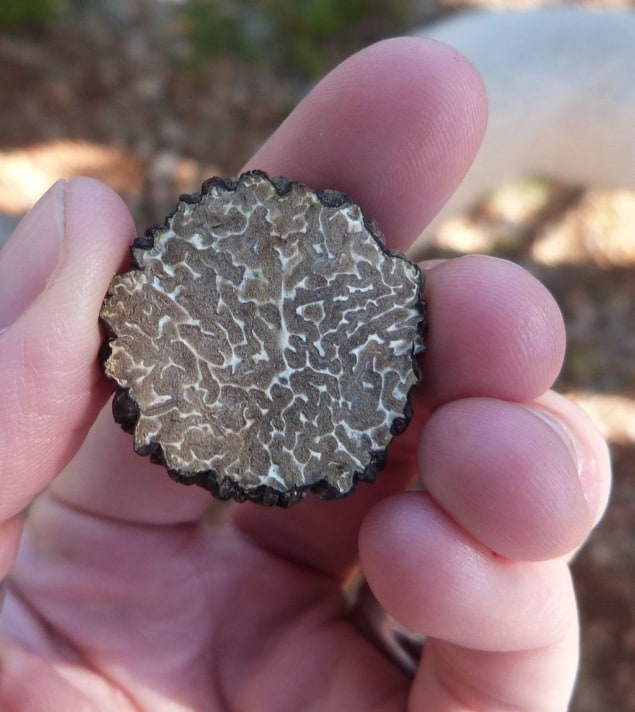
Known as the “prince” of black truffles, Périgord truffles are some of the most sought-after ingredients in the world. A combination of poor harvests and increasing demand has driven prices sky high, with top chefs paying as much as 5000 euros per kilo in recent years.
Unlike the super-rare white truffles from northern Italy and the Balkans, Périgord truffles can be semi-cultivated; there are plantations in the Périgord region of southern France, parts of north-eastern Spain and northern Italy. However, the days of farming truffles in the Mediterranean may be numbered. A study has shown that summer rainfall is key for a good truffle harvest. As drought becomes more common across the Mediterranean, truffle farming could become increasingly challenging but, as a new venture in Wales demonstrates, the Mediterranean’s loss could be northern Europe’s gain.
Cultivating Périgord truffles is still something of a dark art. Farmers grow a host tree seedling in a greenhouse then inoculate its root system with the spores of the Périgord truffle. When the tree is strong enough, they transplant it into a suitable environment — alkaline soil in limestone or chalk areas — and then leave it to establish for 6 to 8 years. Finally, specially-trained truffle-sniffing dogs begin their hunt.
When truffle harvests plummeted in recent years it wasn’t clear what was driving the decline. Farmers guard their techniques closely, and the truffle life-cycle is relatively poorly understood. Ulf Büntgen from the University of Cambridge, UK, and colleagues had a hunch that climate was responsible. To test this theory, they compared 49 years’ worth of truffle harvest data from Spain, France and Italy with climate data from the same period.
Their data clearly showed that truffle yield between November and March was significantly linked to summer rainfall. Wet summers produced bumper harvests the following winter, whilst dry summers led to meagre hauls. The researchers also noticed that wet autumns were detrimental to truffle harvests in the following months.
“It shows that there is a short but crucial period when truffle plantations need to be irrigated,” says Büntgen, who published the findings in Environmental Research Letters (ERL).
Exactly why Périgord truffles require rainfall at this time is not known. Truffles are not at fruiting stage at this point in the year, but it could be a crucial time for the host tree, whose roots the truffles eventually grow upon. “We think that summer rainfall supports the vitality of the host trees,” says Büntgen.
Some truffle farmers do irrigate, but until now there has been no consistent advice over when to do this and how much water to use. “Our work suggests that there is no point irrigating outside of the summer months,” says Büntgen.
The scientists also believe that it is crucial that farmers and scientists work together, sharing data to understand how to optimise truffle harvests. “We don’t know how deep the water needs to penetrate into the soil, how dense the plantations should be, and what kind of understory might help to retain moisture,” Büntgen says.
To help answer some of these questions, and better understand which trees host truffles best, Büntgen and his colleagues are experimenting at the botanic gardens in Cambridge, where there are 2400 species of tree.
In the Mediterranean the increasing probability of summer droughts, combined with a shortage of water for irrigation, may make truffle farming high-risk. However, enterprising farmers further north are demonstrating that Périgord truffles are happy to adapt. Just over ten years ago, Matt Sims planted truffle-inoculated host trees on the sun-drenched chalk soils at his farm in Monmouthshire, Wales. Two years ago, Sims and sprocker spaniel Bella harvested his first Périgord truffles – the first time these fungi have been cultivated in the UK.
This year Büntgen and colleagues published a study showing that white truffles are already marching north, most likely in response to climate change. Black Périgord truffles are likely to follow suit. Helping the truffles adapt to a changing climate will ensure they don’t fall off the menu.



